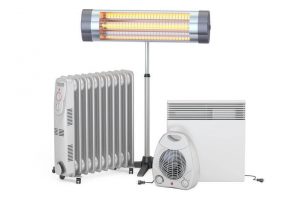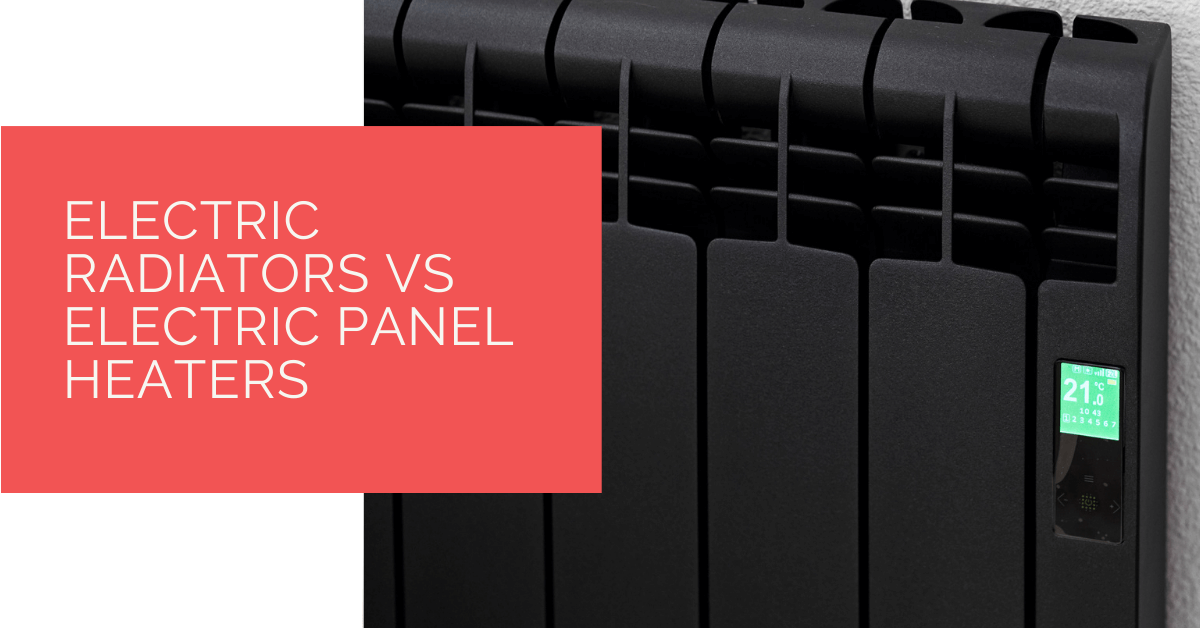As you compare multiple websites to explore the electric heating sector for new heaters for your residence, you’ll undoubtedly come across something perplexing.
You’ll stumble over a variety of electric heating solutions while shopping for the most outstanding deal, and deciding which one is the best is a critical decision.
When it comes to heating your home, you might be thinking of buying an electric radiator or investing in an electric panel heater. Both appliances offer the option of going green by using the natural aspects of electricity.
However, the difference in efficiency is huge, which might help determine which one is the better investment for your home and wallet.
Contents
- 1 Key Takeaways
- 2 Different Kinds of Heaters
- 3 What are Panel Heaters?
- 4 Benefits of Panel Heaters
- 5 What are Electric Radiators?
- 6 Benefits of Electric Radiators
- 7 What is the Difference Between Electric Radiators and Electric Panel Heaters?
- 8 Heat Pump Source: Reliable Heating and Cooling Solutions
- 9 Parting Note
Key Takeaways
- Various types of room heaters are available, including oil-filled, PTC, quartz, carbon-fibre, radiant, and convector heaters, each with its characteristics and suitability.
- Electric panel heaters primarily use convection to heat the air in a room, making them suitable for well-insulated spaces and quick heating needs.
- On the other hand, electric radiators use a combination of convection and radiation to heat objects and people directly, offering efficiency, portability, and versatility in heating poorly insulated areas.
Different Kinds of Heaters
Room heaters operate on a myriad of principles and technologies, and they come in a variety of pricing ranges.
There are many different room heaters on the market, each with its own shape, design, price, and other characteristics. If you’re unsure which type of heater is right for you, here’s a detailed description of each type that can assist.

- Oil-filled Room Heaters: This room heater is appropriate for all living spaces and is ideal if you want your room’s temperature to remain consistent for an extended period. They are relatively slow in dispersing the heat since the oil is warmed first and then spreads the heat around the room.
- PTC Room Heaters: PTC refers to the Positive Temperature Coefficient, which aids in keeping the room’s temperature steady for a more extended period. They don’t overheat the area and rapidly attain the desired temperature.
- Quartz Heaters: These compact room heaters use radiation and are ideal for heating small spaces. The heated filament is contained within a heat-resistant quartz tube. If you have children or pets at home, you should avoid using them because they can become extremely hot and uncomfortable.
- Carbon-fibre room heaters:: These heaters uniformly disperse heat in the area and prevent the air from drying out while using very little electricity. As a result, they are beneficial to you if you believe that traditional room heaters suffocate you.
- Radiant Heaters: Radiant heaters use infrared radiation to heat the area and are most advantageous when you stand near them. Since it heats the products rather than the air surrounding them, it is excellent for individuals who are allergic to dust.
- Convector Heaters: These are inconspicuous room heaters renowned for heating a room uniformly and adequately. Its coils are heated when the temperature decreases, and the room automatically begins to warm up.
What are Panel Heaters?
Panel heaters are affordable home heaters that only use convection to heat. Panel heaters are usually referred to as “panel radiators” or, more precisely, “convection heaters.” They warm spaces by heating the air.
The hot components in the panel’s core warm the air as it flows around the area, keeping the residents warm by enclosing them in a cocoon of warmth.
That doesn’t imply that electric panel heaters always distribute heat uniformly around a room. If the fan that circulates the warm air through the heater isn’t powerful enough, you’ll have chilly pockets. Cold feet and a hot head are two classic signs of insufficient heating.
These heaters are less expensive and simpler to construct than electric radiators since the heating elements are not encased.
Conversely, these heaters are frequently noisy. The fan may make it challenging to hear subtleties or murmurs in your TV show.
Benefits of Panel Heaters
Let’s discuss the advantages of panel heaters now that we’ve reviewed what they are and how they operate.
- Heats up Quickly: Electric panels heat up rapidly and provide immediate warmth whenever you need it.
- Robust: Most panel heaters come with the choice of being free-standing or being wall-mounted.
- Ideal for Well-insulated Rooms: Electric panel heaters are best used in well-insulated areas since the hot air they produce does not escape.
- As the name implies, sleek Design: Panel heaters are designed like panels. It renders them ideal for use in smaller areas where you wouldn’t want a big radiator protruding from the wall, and they’re also simple to stow when not in use.
What are Electric Radiators?
Radiant heaters, such as standard space heaters, emit heat in a straight line, much like the sun radiates warmth outward. This means that any object in the path of the heater will absorb the heat.
Electric radiators have become increasingly popular in the UK due to their ability to provide a substantial amount of warmth quickly. Unlike fan-based heaters, radiators do not circulate dust or pollen, making them an excellent option for those on a budget.
In the past, older space heaters were prone to tipping over and causing fires, which led to misconceptions about the safety of radiators. However, modern radiators have safety features like ‘kill switches’ that disconnect the power if the heater becomes unsteady.
Benefits of Electric Radiators
Electric radiators are an excellent heating option because of a multitude of factors. They have several advantages, like convenient control, targeted heating, and simple installation, but that isn’t all.
We’ll look at the various advantages of electric radiators below to see why they’re such a great option for warming your house.
- Efficiency: Electric radiators take a little longer to heat up than panel heaters, although they consume less energy. They also keep warm for longer without electricity, which is beneficial if you intend to use your heater all night.
- Small and easily transportable: Radiators are thin and compact enough to be moved around your house to any room. They’re even suitable for garages and caravans.
- Ideal for rooms that aren’t well-insulated: Electric radiators are more efficient in poorly insulated areas because they emit more warmth.
- Suitable for more than just Warming a Room: Radiators can be used to heat your house, as well as to dry clothes and keep frost at bay.
What is the Difference Between Electric Radiators and Electric Panel Heaters?
Instead of the air around them, electric radiators heat individuals and items in their proximity. How the sun heats the earth is an excellent demonstration of radiation.
The heat from the sun travels 93 million miles across space before striking the earth and heating its surface, raising the temperature of the air surrounding it.
 On the other hand, the motion of gases or liquids, often air or water, is used to transport heat from one location to another in panel heaters.
On the other hand, the motion of gases or liquids, often air or water, is used to transport heat from one location to another in panel heaters.
The main difference between electric radiators and electric panel heaters is that the former uses convective and radiated heat, whereas the latter uses convection primarily to produce heat, usually employing hot materials and a fan to circulate hot air about the room.
While electric radiators are sometimes more costly to buy, we feel they are much more cost-effective than panel heaters and outperform them on various other frontiers.
Radiant heating is much more effective than convection heating since the heat is transported directly to the things and individuals in the space, while with convection, warm air is transmitted to the air first and from there to the products and individuals in the area.
This is vastly more expensive in energy expenses than the electric radiators’ direct and convection radiation blend.
Panel heaters are less effective than electric radiators, so they have to work extra hard to heat the very same area, making them less dependable.
Movable components such as heating fans are also used in panel heaters, which have a shorter life expectancy than the stationary heating components present in electric radiators.
In contrast to most electric radiators, panel heaters are frequently built cheaply. Warm air circulation can agitate dust allergies and exacerbate allergy symptoms. It is less probable to happen with electric radiators.
Heat Pump Source: Reliable Heating and Cooling Solutions
At Heat Pump Source, we take pride in our unwavering commitment to serving the UK with top-tier HVAC solutions. From the efficiency of heat pumps and the cool relief of air conditioning to the warmth of boilers, radiators, and underfloor heating, our dedicated team is always at the forefront of innovation. We understand the unique needs of every household and business, and we strive to provide dependable health and cooling products and services that are tailored just for you. Ensuring your comfort and satisfaction is our utmost priority. Whether you have questions, need guidance, or require support, we’re always here to assist. Please don’t hesitate to contact us; we’re eager to be of service.
Parting Note
It’s one thing to wear sweaters and sip hot cups of coffee in the winter, but you also need to make sure your home keeps you toasty on the exterior.
If you plan ahead of time, you won’t need to wear your jacket inside the home, which means figuring out the best way to be as warm and comfortable as possible. Electric heaters are helpful in this situation.
The fundamental distinction between electric radiators and panel heaters is that the former stores heat and is excellent for daily usage, while the latter doesn’t store heat and is only used occasionally.
Purchasing an electric radiator at this time is perfect. Get a head start on the hordes as costs begin to rise in response to increased demand. Furthermore, nothing is worse than awaiting a replacement or repair in a chilly house.
About the Author
At Heat Pump Source, our articles are the product of a collaborative effort among a team of highly skilled HVAC experts. Our dedicated professionals, hailing from diverse backgrounds in heating, ventilation, air conditioning, and refrigeration, contribute their extensive knowledge and experience to every piece of content. This multidisciplinary approach ensures comprehensive coverage. Our commitment is to deliver authoritative, reliable, and tailored advice to meet the unique needs of every household and business across the UK.

